News
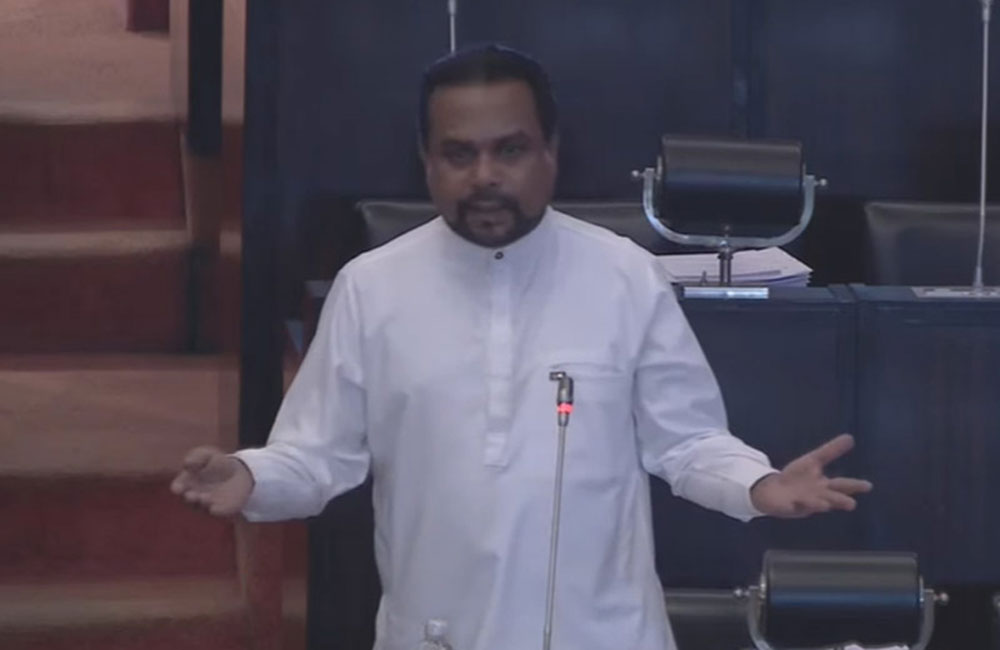
Wimal reveals IMF’s crime against Sri Lanka
The International Monetary Fund (IMF) is moving to make sure that Sri Lanka repays its debts even if its people die of hunger, charged Supreme Lanka Council leader Wimal Weerawansa.
At the behest of its US, UK, German and other masters, the IMF is laying down conditions for endless taxes, higher interest rates, to make the Central Bank independent while ruining local banks, the MP said at the House debate on March 23 on the IMF bailout loan that Sri Lanka has secured.
These masters of the IMF account for 36 per cent of Sri Lanka’s total foreign borrowings through international sovereign bonds, but claim as much as 76 pc of the combined loan interest repayments, according to Weerawansa.
After seeing hilarious scenes of lighting firecrackers and government MPs thanking the president for securing the IMF loan, the second stage will see the restructuring of foreign and local debts.
That will cause massive harm to the country’s financial and banking systems, as in the case of Greece, he said.
Weerawansa quoted from Greece’s former finance minister Yanis Varoufakis, well-known writer Naomi Klein, economist Milton Friedman and ex-chief economist of the World Bank Joseph Stiglitz to support his allegations against the IMF.
The IMF’s attempts to lure Sri Lanka further into a debt trap, while forcing it to sell profit-earning state enterprises and retaining the burden of the loss-making ones, is a crime that should not be allowed, he added.
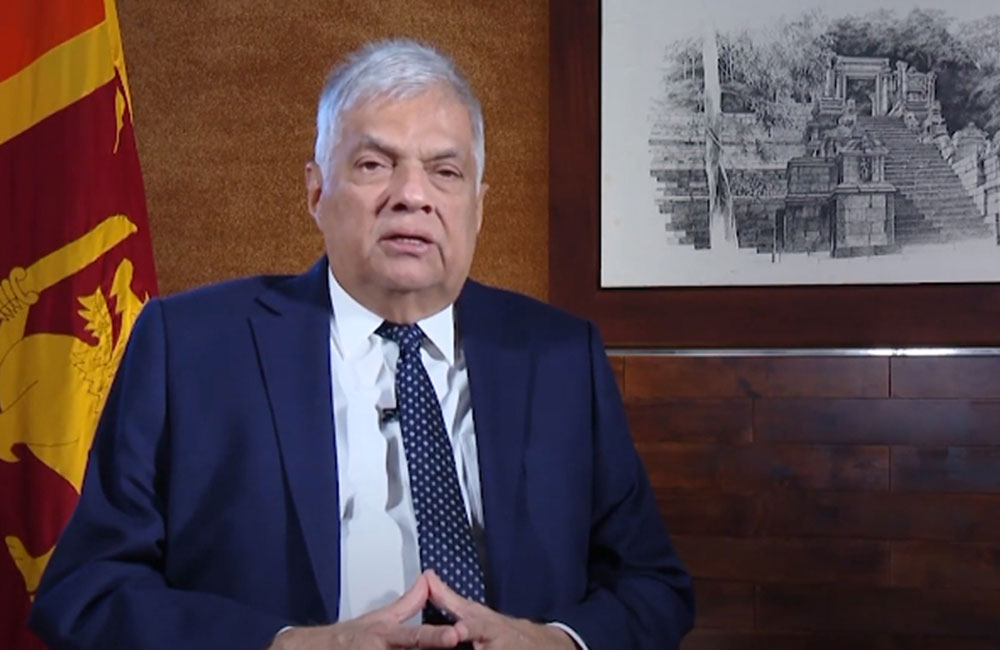
Govt. working to lift import restrictions - President
The government is working to gradually lift import restrictions on essential goods, medicines, and tourism-related goods, as the foreign exchange situation in the country improves, President Ranil Wickremesinghe said.
In a special statement today (21) following the approval of the Extended Fund Facility by the Executive Board of the International Monetary Fund (IMF), President Ranil Wickremesinghe emphasized that Sri Lanka is no longer deemed bankrupt by the world.
He further stated that the loan facility serves as an assurance from the international community that Sri Lanka has the capacity to restructure its debt and resume normal transactions.
President Wickremesinghe expressed gratitude to all countries that supported the International Monetary Fund agreement, as well as the heads of the International Monetary Fund and the World Bank.
Wickremesinghe said that he plans to present a full statement on the matter in Parliament tomorrow (22),adding that the agreement with the International Monetary Fund will also be tabled in Parliament.
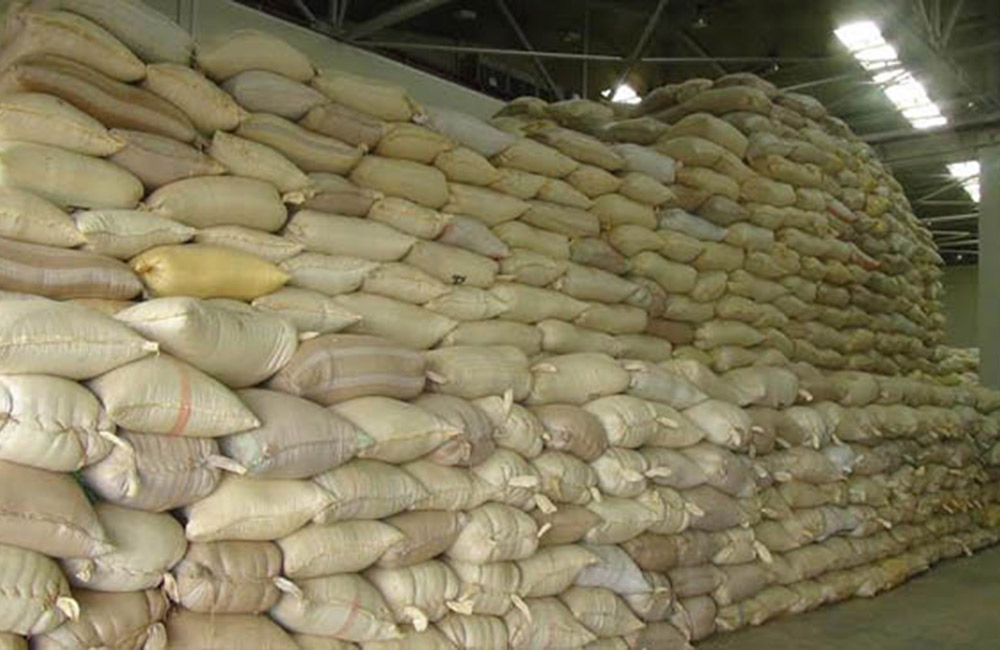
Free rice from Govt for to 2.9 million families
Starting tomorrow, March 27th, Minister of Agriculture Mahinda Amaraweera has announced that the government will begin distributing free rice to 2.9 million families.
The rice being distributed comes from the paddy purchased from farmers during this year’s Maha season, which has been converted into rice.
In addition, the government has decided to give each family 10 kilograms of rice per month for a period of 2 months. The distribution will take place in several districts, including Colombo, Gampaha, Kalutara, Kandy, Ratnapura, Galle, and Matara, as requested. The Minister of Agriculture emphasized the importance of this program in supporting the local farmers and ensuring food security for families in need.
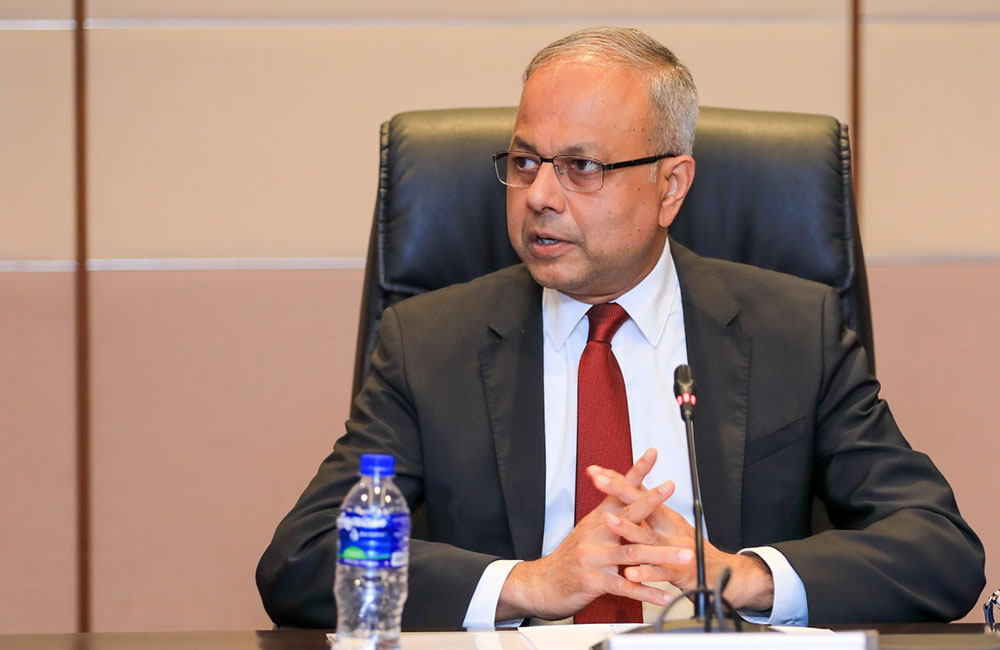
Sagala stresses accountability of public officials
Recovering from the challenging situation that Sri Lanka is currently facing requires a significant emphasis on the accountability of public officials in matters such as financial control, anti-corruption measures and adherence to the rule of law, Chief of Staff to the President Sagala Ratnayaka said.
He made this observation at a meeting with officials of the International Monetary Fund (IMF) and heads of state agencies yesterday (20).
Ratnayaka, also senior presidential advisor on national security, highlighted the important role of the government and its officials in this difficult period.
Officials of the IMF commended the government for its correct evaluation of the matters as they stand and noted the bilateral agreements reached on state agencies and the market, regulations, supremacy of the law, money laundering and fiscal control.
Rather than worrying about mistakes made in the past, the focus now should be on the essential reforms, with the IMF standing ready to support in meeting challenges and priorities in reforms, they also said.
Ratnayake stressed the importance of holding regular meetings to discuss progress and called for commitment by the line agencies.
Finance secretary Mahinda Siriwardena and Central Bank governor Dr. Nandalal Weerasinghe were among the other participants.
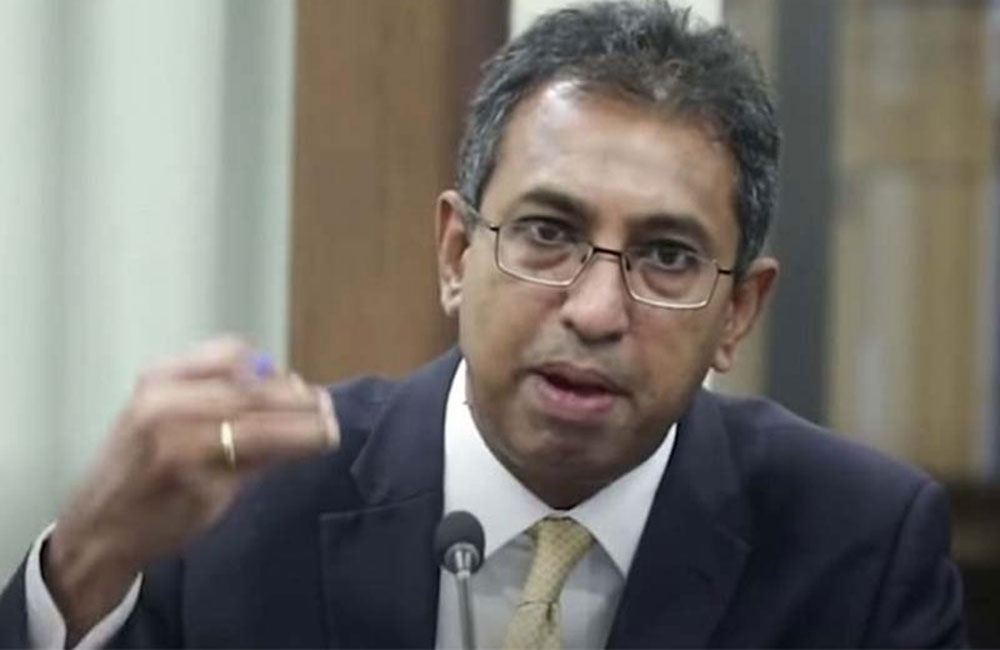
Harsha urges Govt. to discuss plan ahead
Opposition MP Harsha de Silva, in response to the President's speech on the IMF agreement, said that he was relieved that the government had finally obtained the approval of the IMF Board for the USD 3 billion facility.
He commended the President for convincing his majority SLPP government on the IMF program who until recent times was totally opposed to it.
Dr de Silva stated the only political party that tabled their own plan out of the crisis was the SJB. He said their plan, named the “Blueprint”, first tabled in August 2022 and an updated version in February 2023, contained a detailed plan on how to come out of bankruptcy and set the stage for sustained growth.
He said the Blueprint dealt with the sensitive issue of taxes. He criticized the highest marginal tax rate of 36% being applied at Rs 300,000 a month. The lawmaker pointed out that the maximum rate for those earning approximately Rs 500,000 a month could be capped around 24 to 25%, while the highest tax bracket would increase to 39-40% to achieve the expected income.
Reiterating that they were ready to help the government wholeheartedly to rescue the country from the crisis, De Silva stressed the need to come out of this IMF agreement victorious, as this could not be another failed attempt. He called for unity regardless of party allegiances, as the President stated, as this was only the start of a long road.
The next biggest hurdle was the debt-restructuring process, and to do that, massive economic reforms were necessary. De Silva clarified what these reforms were, stating that the government revenue needed to increase from 8.5 percent to 15 percent of GDP. He explained that over 95 percent of government revenue was tax revenue, and only 5 percent was non-tax revenue.
He added that to increase revenue, the economy must expand. But currently it is contracting, with lending rates increasing to 30 percent. Many small-medium enterprises had closed as they couldn't keep up with the rates. Additionally, export companies were planning to move shop as taxes on the export sector had gone up to 30 percent while neighboring countries were only 12 to 15 percent.
The SJB lawmaker called for a plan to turn the economy around and create jobs. He noted that the IMF agreement was only a stabilization program and not a roadmap to develop the country. He noted that they needed to have a consistent political ideology governing the country, failing which they would go nowhere.
De Silva stressed the need to cut Sri Lanka’s debt stock but argued that foreign creditors were not willing to carrying the entire burden, as, of Sri Lanka's debt to GDP ratio of 128 percent, 63.6 percent was foreign debt, while 64.6 percent was domestic.
De Silva noted that the IMF's focus was on the government reducing the gross financing need from about 34 percent to 13 percent of GDP and that the question of domestic debt restructuring had been raised at the press briefing by the IMF yesterday. Although IMF stated that methodology was irrelevant to them, they were insinuating that domestic restructuring had to happen.
He urged extensive discussions on critical issues like these, as they could not hastily state whether they agree or oppose such measures. According to de Silva, there was roughly Rs 14 trillion domestic debt, out of which Rs 4 trillion was in Treasury bills, and Rs 9 trillion was in Treasury bonds. He questioned whose debt will be cut and what the roadmap for reducing this debt will be. De Silva believed that extensive discussions are necessary as most of the local debt is from the Employees Provident Fund (ETF) and local banks that consist of people’s hard-earned money.
Another critical issue that de Silva highlights is the impact of the economic crisis on low-income households. In particular, he highlights the issue of electricity tariffs, which have increased by over 1,100 percent in a short span of time for the bottom 25 percent of consumers, who use less the 30 units a month.
De Silva suggested that it is not the responsibility of the Ceylon Electricity Board (CEB) to provide subsidies to low-income households. He argued that if this is the case, the Board will never be able to become profitable. Instead, de Silva argued that it is the responsibility of the government to cushion low-income households by providing subsidies to those who need them, while the EB focuses on becoming profitable.
De Silva emphasized the need to move away from traditional politics that advocate for providing subsidies to all or going on strike. He suggested that developed countries, or even developing ones like India with their Aadhar system, are able to determine who needs help and provide adequate assistance via budget allocations. He insisted Sri Lanka adopt a mechanism of targeted subsidies.
De Silva concluded by expressing his general agreement with the Sri Lanka’s IMF program but urged further discussion to resolve the contentious issues.
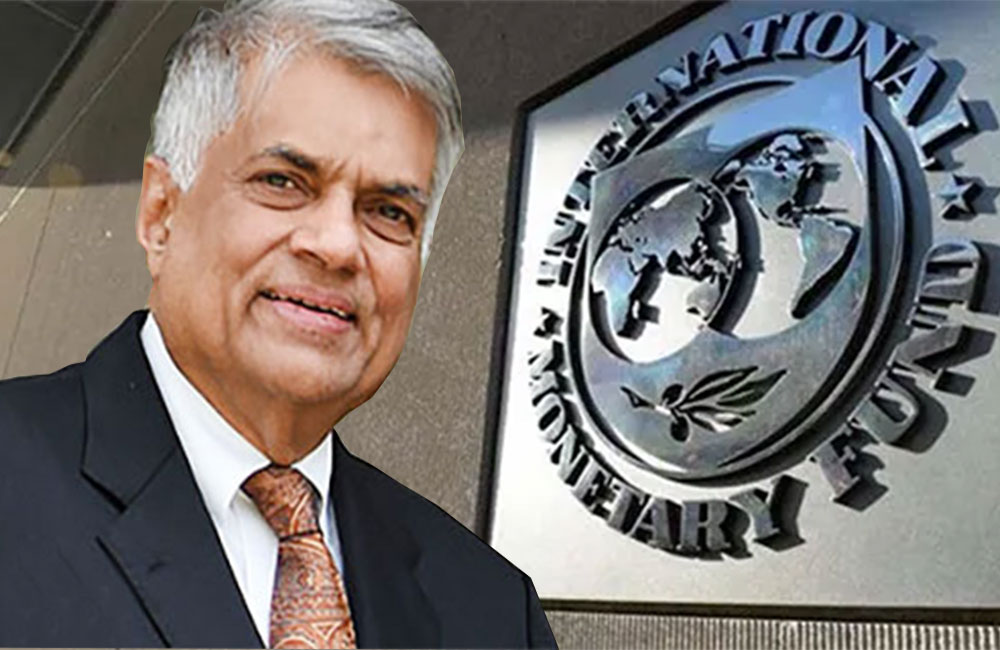
IMF approves Sri Lanka's bailout package under EFF; Sri Lanka can access up to $ 7 Bn
The IMF Executive Board approved Sri Lanka’s program under the Extended Fund Facility (EFF) that will enable Sri Lanka to access up to $7 billion in funding, reported the President's Media Division.
President Ranil Wickremesinghe has expressed his gratitude for the support of the IMF and other international partners, said the PMD.
It added that the President committed to full transparency in all discussions with financial institutions & creditors, & to achieve sustainable levels of debt through prudent fiscal management & an ambitious reform agenda.
The IMF program is critical to achieving this vision & will help to improve Sri Lanka's standing in international capital markets, making it an attractive country for investors, talent, & tourists, said the President's Media Division.
Earlier this month, Sri Lanka received IMF-compatible financing assurances from its official creditors, including Paris Club members, India and China, allowing the IMF to convene an Executive Board and consider Sri Lanka’s request for a loan.
The program is expected to provide much-needed policy space to drive the economy out of the unprecedented challenges and instill confidence amongst all the stakeholders.
President Ranil Wickremesinghe welcomed the announcement:
“In the 75 years of Sri Lanka’s independence, there has never been a more critical period for ou economic future. Our official creditors have declared their support following continuous and positive engagements over the last few months, and we are pleased that the IMF Executive Board approved our program, enabling Sri Lanka to access up to US$ 7 billion in funding from the IMF and IFIs. From the very start, we committed to full transparency in all our discussions with financial institutions and with our creditors. I express my gratitude to the IMF and our international partners for their support as we look to get the economy back on track for the long term through prudent fiscal management and our ambitious reform agenda.
Since taking office last July, it has been my priority to stabilize Sri Lanka’s economy and achieve sustainable levels of debt. To do so, we have taken some tough decisions, but we did so with a commitment to widening our social safety nets, protecting the vulnerable, rooting out corruption and ensuring we can grow an inclusive and internationally attractive economy. The IMF program is critical to achieving this vision for our country, and we are committed to successfully completing the IMF program and achieving debt sustainability. We will continue to engage with all our creditors, and I encourage both our bilateral and commercial creditors to strengthen and foster coordination in the context of our forthcoming engagement. The IMF program will also be imperative to improving Sri Lanka’s standing in and access to international capital markets, and it will demonstrate that Sri Lanka is once again a country attractive to talent, investors and tourists.”
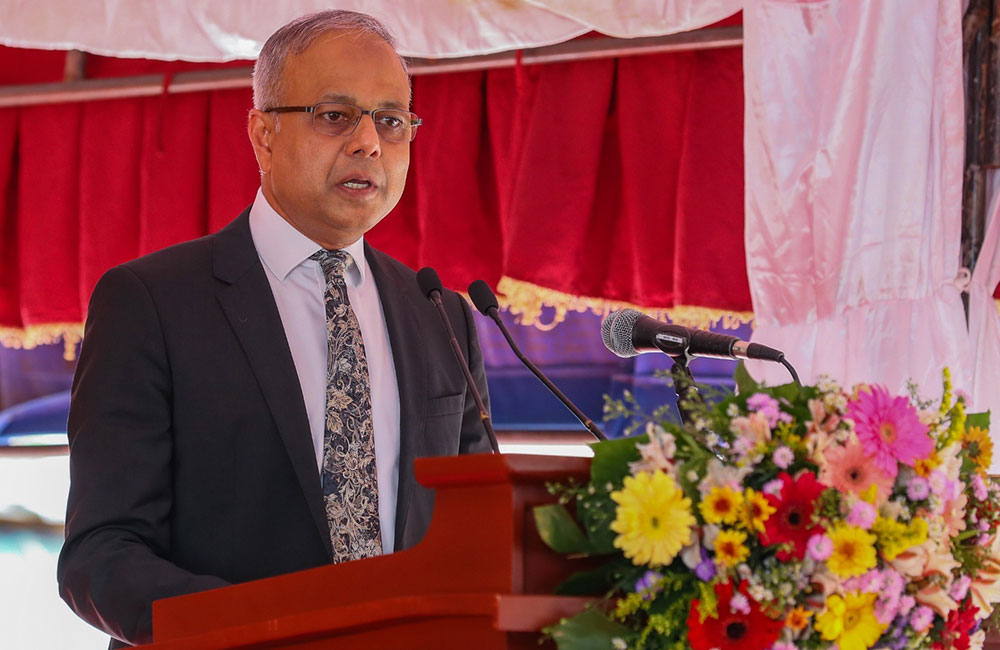
Govt. has no intention to dissolve Civil Service Department – Sagala
Senior Advisor to the President on National Security and Chief of the Presidential Staff, Sagala Ratnayake, has assured that the Government has no intention of dissolving the Civil Service Department (CSD).
Participating in an appreciation ceremony held last (24 March) afternoon at the CSD headquarters in Katubedda, Moratuwa, to acknowledge the efforts and contributions of the officers of the CSD, Ratnayake stated that the CSD was approved as a depreciable service according to the 2015 Cabinet paper, but that period has now lapsed.
He noted, however, that the members of the CSD are allowed to request a service extension beyond the age of 55, enabling them to serve for up to 60 years.
He emphasized that there have been no alterations to these policies and that there are no plans to modify them in the future.
During the ceremony, which was chaired by the Minister of State for Defence, Premita Bandara Tennakoon, the contributions of the CSD in service to the country were recognized and appreciated.
Ratnayake also interacted with the members of the CSD, inquiring about their work and engaging in friendly conversation.
Following the ceremony, both Ratnayake and Tennakoon held a meeting with the Director General of the CSD, Major General Ranjith Kalkahewege (Retired) and other senior officials to discuss its future affairs and operations, subsequent to which, the duo were presented with commemorative gifts by the Director General of the CSD (Retired) to mark the occasion.
Following the ceremony, the Minister of State for Defence, Mr. Premita Bandara Tennakoon, and Mr. Sagala Ratnayake held a meeting with the Director General and senior officials of the Civil Service Department to discuss its future affairs and operations.

Rs. 1.1 million interest free loans to pursue higher studies
The government has decided to launch a programme where a bank loan of Rs. 1.1 million will be granted without any interest to students who have excelled at the Advanced Level Examination but do not get the opportunity to enter state universities due to strong competition.
This loan will be given to enable them to study in private universities in the country for a degree suitable for obtaining a job.
State minister of finance Ranjith Siyambalapitiya said that the loan facility will be granted to students with high Z-Scores to study courses where there are ample job opportunities through private universities.
Previously, a sum of Rs. 800,000 was granted interest-free through the Bank of Ceylon for students to enable them to engage in degree courses.
Under the new programme, Minister Siyambalapitiya said that a sum of Rs. 800,000 as well as Rs. 300,000 on behalf of daily expenses will also be provided.
It has been extended so that students can obtain this facility through the People’s Bank as well as the National Savings Bank.
The cabinet paper regarding this is to be submitted to the cabinet by the minister next Tuesday.
Arrangements will be made in the future to grant this facility to 500 students based on instructions of President Ranil Wickremesinghe.
After obtaining this loan facility and then leaving the university, while engaged in a job this loan has to be paid back within a year.
Since loan interest is 25% at present, students who want to study in universities are unable to engage in higher education by obtaining a loan to pay costs.
Their parents also cannot bear the burden of such high-interest loans.
Taking this situation into consideration the State Minister said that the loan facility for higher education without interest which had been halted will recommence.
(sundayobserver.lk)
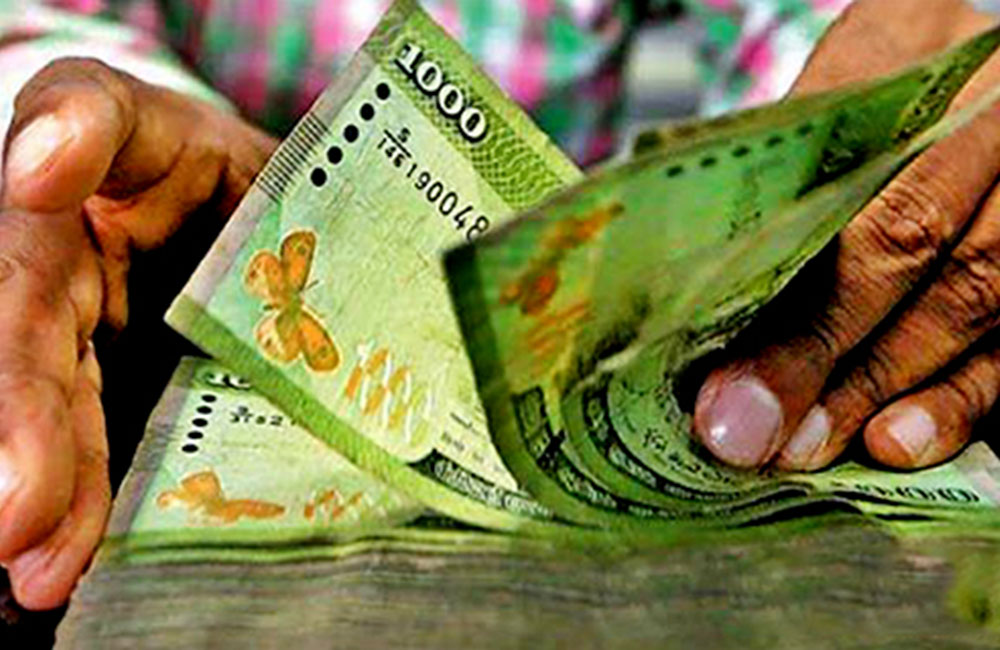
Salaries, pensions & Samurdhi allowances will be paid by 10 April – State Minister
State Minister of Finance Ranjith Siyambalapitiya has assured that measures are underway to pay the salaries, pensions and benefits including the Samurdhi allowances of public servants for the next month before 10 April.
Speaking to the media in Kegalle, the State Minister explained that it was decided to make these payments before the relevant date, in view of the upcoing Sinhalese and Tamil New Year festival.
He noted that measures in this regard are currently underway on the instructions of the President.
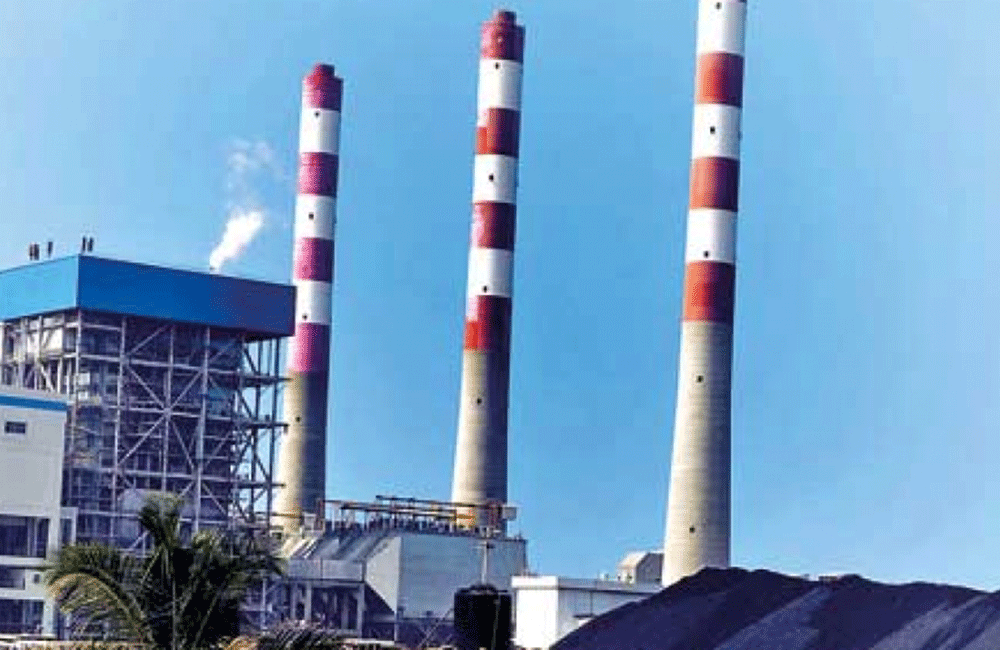
Norochcholai break down : Update from Minister
Power and Energy Minister Kanchana Wijesekara says that the Ceylon Electricity Board has informed of a breakdown in unit 3 of Norochcholai power plant.
“Unit 3 was due to undergo major overhaul maintenance in April. To ensure an uninterrupted power supply, CEB owned Diesel & Fuel Oil Power plants will be used. There will be No power cuts due to the breakdown.” Minister said.
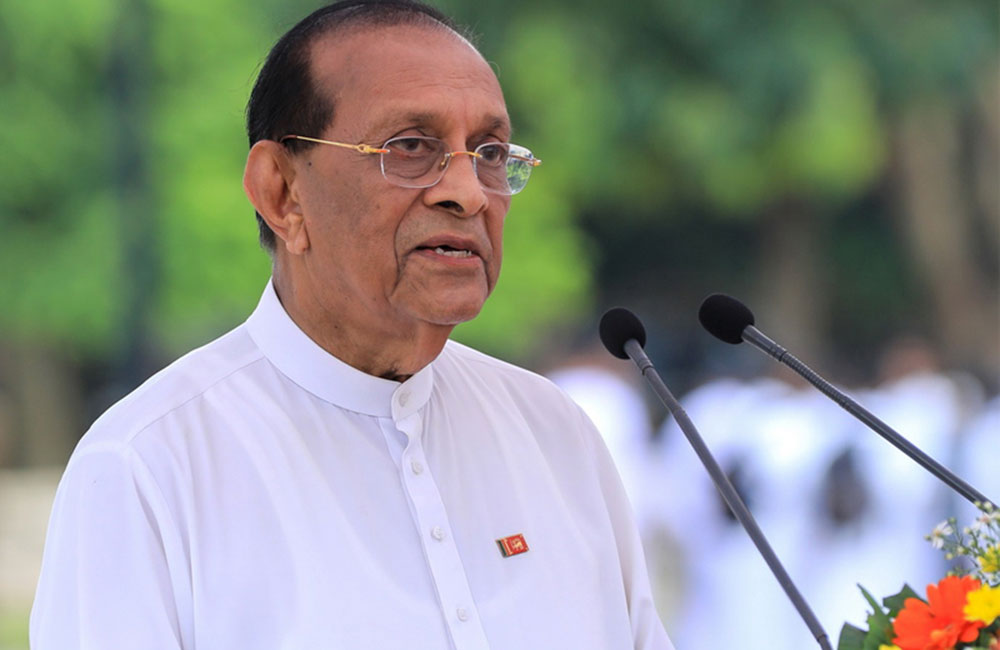
Karu calls for a change in public attitudes
The Chairman of the National Movement for Social Justice (NMSJ) Karu Jayasuriya called for a change in public attitudes, pointing out that the 'System Change' which is asked for by the young generation is similar to it.
Noting that it is not something that the Government or Parliament can do alone, he said the whole country should rally for it.
The former speaker also said that even before they proposed to implement the reforms recommended by the International Monetary Fund (IMF), the NMSJ continued to propose that they be implemented. "If we had paid attention to it in the first place, we would not have gone into an abyss," he said.
Jayasuriya made these remarks at the 71st death commemoration of the late D.S. Senanayake that was held at the Independent Square yesterday (23).
As the Chairman of the D.S. Senanayake Commemoration Committee, he welcomed all who had attended the event, and highlighted the presence of President Ranil Wickremesinghe as the Head of State.
Speaking further, he said:
"We have been coming here and paying floral tributes to D.S. Senanayake on both Independence Day and 22 March for the past few decades and going home, but did we accept the advice of this leader? He did not have a doctorate. However, he took necessary expert advice in building the country. The most important message he gave was to preserve "national identity". We paid a heavy price in blood because we didn't do it. We had to face ethnic issues, acts of terrorism, destruction of property, and we were severely criticised by the world. Our nation, our religion is not something that we asked for. It is something that we receive since our birth. A Buddhist can never be racist. Buddha preached about one human race. In the Vasetta Sutta of Majjima Nikaya, Buddha preached about the different differences of the same species of animals such as quadrupeds, birds and fish, and that there is no such difference in humans."
He further said that there are many important lessons to learn from D.S. Senanayake.
"I am talking about these matters as I see certain groups attempting to create racial and religious differences with narrow political agendas. If it happens, it could be the end of our country. We gained independence because all the nations united and put pressure on the British Crown together. Fortunately, the leaders of that time understood the value of this national unity. They joined hands for independence irrespective of any difference. We must be forever indebted to those Sinhala, Tamil, Muslim and Burgher leaders. F.R Senanayake, D.S Senanayake, Ponnambalan Arunachalam, Ponnambalan Ramanathan, Sir D.B Jayathilake, S.W.R.D. Bandaranaike, T.B. Jaya, E.W. Perera, Sir James Peiris, J.R. Jayawardena, Dudley Senanayake and all those who worked together to grant freedom to the nation are remembered with respect and devotion.
Although there is no time to describe the unlimited work planned by D.S. Senanayake for the country for a long time, it is not a secret how he suffered and made sacrifices for the development of the country's agriculture. Due to the awakening of Ampara District through the Gal Oya movement, 22% of Sri Lanka's rice production is still cultivated in Ampara District. Now the 2nd or 3rd generation lives there. They seem to be forgetting him now. The reason is that the current generation has not been given sufficient knowledge about national heroes. It is a shortcoming of our country's education system and because we, as adults, do not give our children the correct knowledge about our ancestors. This should be corrected. Forgetting the past can be harmful to a country. A country that forgets its heroes has no future.
We should stand in front of the statue of D.S. Senanayake and think of the future. We don't live in the world which was there by then, but in an age where technology is developing every day. The world changed because of the Covid-19 pandemic. Even nature punishes the universe today with earthquakes, floods, etc. We in Sri Lanka also faced infinite difficulties in the recent era. Poor people were the most affected by the collapse of the economy.
Due to the IMF assistance, the foreign exchange crisis is being solved successfully. This is a great relief for us. Now there are indications that we will get the goodwill of the world. The arrival of tourists is increasing every day. Remittances by foreign workers are quite high, but it is not possible to develop a country just by getting these things.
An attitudinal change is needed in our people. The 'System Change' which is asked for by young generation is similar to it. It is not something that the Government or Parliament can do alone. The whole country should rally for it.
To rebuild the country, we must first become a punctual nation. We must understand that it is wrong to get paid without working eight hours a day or the prescribed number of hours. In terms of population ratio, our country has the largest public service in the world. However, it has been mentioned that Sri Lanka is the country with the most holidays in the world. According to the population ratio, Sri Lanka is mentioned at the top among the countries with the highest military strength in the world. We have an army that is larger than those in Great Britain and Bangladesh. There are about 300 Government agencies that embezzle public money. Corruption and lawlessness in the country has spread, and the country has fallen into the abyss. Murders, robberies, rape and drug use have increased. All these burdens and pains are ultimately borne by our innocent people. A country without discipline will never move forward. We should understand all this and work for the development of the country."
The Minister of Justice made a public statement last week about the irregularities in the implementation of the law. These should be corrected immediately. Law enforcers should maintain their professional dignity and set an example. We have mentioned several times that there is a need for some unity in the Parliament to solve the pressing problems of the country. We appealed to the Parliament to implement a ceasefire. That idea received optimistic responses.
Late J.R. Jayewardene, who participated in the San Francisco conference in 1951 to plan the future of Japan under the advice of D.S. Senanayake cited the verse "Nahi Verena Verani" and said that Japan should be forgiven. The powerful leaders accepted that thinking. I believe that if D.S. Senanayake were alive today, he would have given similar advice to the State and to all of us. Even if they are not alive, we believe that we should follow the good ways they showed."
Jayasuriya concluded his remarks saying: "Honourable President, distinguished guests and friends, if there is any importance in these thoughts, I respectfully request that you pay attention to them. We mentioned the voices of the majority of the society."
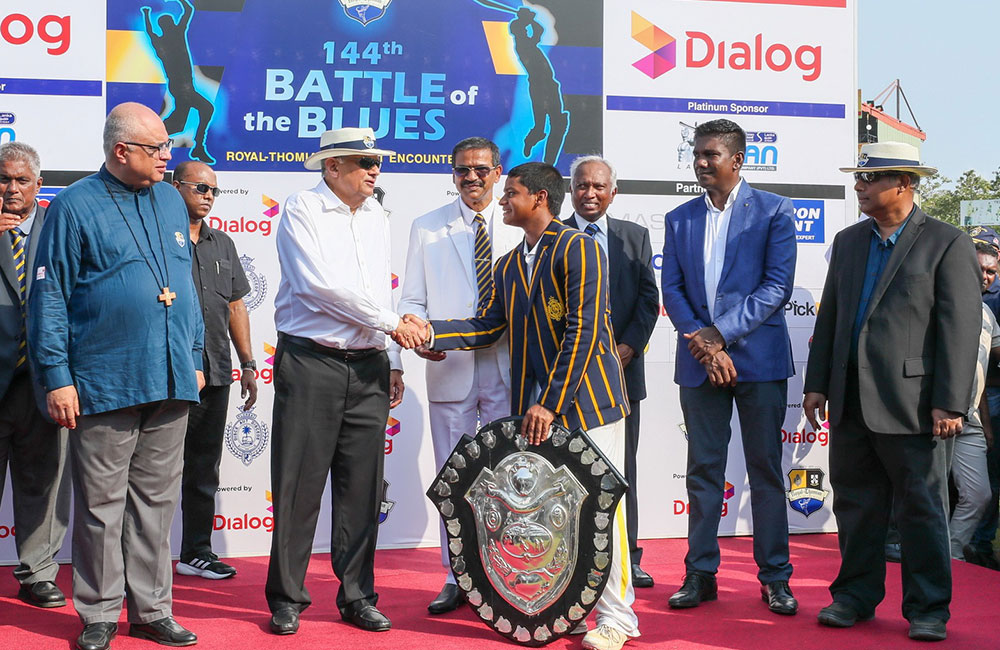
Royal College wins 144th Battle of the Blues
Royal College Colombo have won the 144th edition of the Battle of the Blues with a comprehensive 181 run win against S. Thomas' College Mount Lavinia.
This is the 36th time that Royal College have won the Battle of the Blues.
Royal, who were put into to bat first in the match held at the Colombo SSC ground, declared their 1st innings on 326 runs for the loss of 8 wickets.
In reply, S. Thomas' were restricted to just 153 runs.
Royal College then declared their 2nd innings 168 for the loss of 4 wickets, setting the Thomians a massive target of 342 runs to win.
However, S. Thomas' were only able to manage 161 runs in their 2nd innings.
Dasis Manchanayake, who led Royal College, scored a magnificant century in the first innings and scored 57 runs in the second innings.
Royal College last won in 2016.
https://casite-790485.cloudaccess.net/news?sa=U&start=1584#sigProId7f6fb0e987
Page 133 of 535
